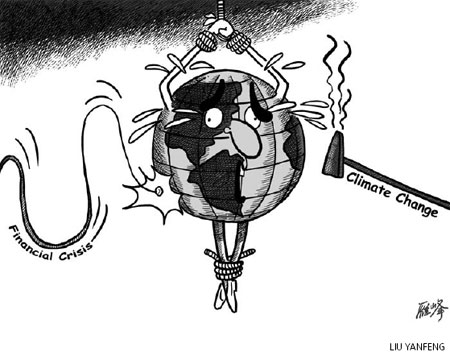
As the US financial tsunami unfolds and an extended period of recession in developed countries looms, China made a strong gesture yesterday on battling climate change.
The Chinese government yesterday published its white paper on climate change, signaling that the severest economic crisis since the Great Depression will not weaken China's determination of bringing economic growth on sustainable track.
The white paper signals its determination to bring a global deal on climate change to replace Kyoto Protocol as the world is now in the middle of the two-year journey from Bali, where negotiation were launched, to Copenhagen which hosts the crucial meeting of the United Nations Framework Convention on Climate Change (UNFCCC) at the end of next year when the world must craft and clinch the deal.
It also repeatedly stresses that the Chinese government has been poised to fulfill its promises on sustainable development though the worsening global economic situation makes it difficult for China to predict its growth for next year.
In some way, it was relatively easy for China to make the policy shift to increase investment in sustainable development as the central government's determination in this regard was shown even when there was no financial crisis. And now the financial crisis will propel the government to expand spending and help strengthen its determination to promote growth that can be sustained.
Still it is uncertain how fast China's economy will grow next year, Liu He, deputy director of the Office of the Central Leading Group on Finance and Economy Work, pointed out last Friday that economic slowdown can work as an opportunity to restructure its economy, which has relied heavily on government investment, foreign trade and low-cost technology over the past years.
When the economy is experiencing fast growth, companies are unwilling to upgrade their technologies but the slowdown gives such firms the opportunity to enhance their competitive edge through better technologies.
For him, this is an opportunity for China to embark on low-carbon path, which means China will implement tougher measures to save energy, control pollutant emissions and promote responsible ways of investment.